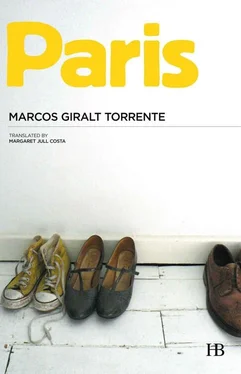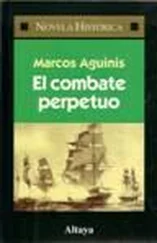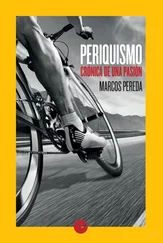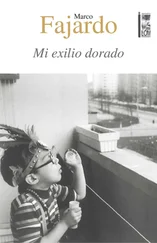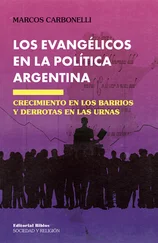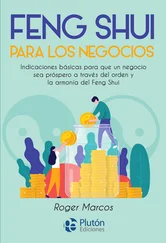Marcos Giralt Torrente - Paris
Здесь есть возможность читать онлайн «Marcos Giralt Torrente - Paris» весь текст электронной книги совершенно бесплатно (целиком полную версию без сокращений). В некоторых случаях можно слушать аудио, скачать через торрент в формате fb2 и присутствует краткое содержание. Год выпуска: 2014, ISBN: 2014, Издательство: Hispabooks, Жанр: Современная проза, на английском языке. Описание произведения, (предисловие) а так же отзывы посетителей доступны на портале библиотеки ЛибКат.
- Название:Paris
- Автор:
- Издательство:Hispabooks
- Жанр:
- Год:2014
- ISBN:9788494228452
- Рейтинг книги:5 / 5. Голосов: 1
-
Избранное:Добавить в избранное
- Отзывы:
-
Ваша оценка:
- 100
- 1
- 2
- 3
- 4
- 5
Paris: краткое содержание, описание и аннотация
Предлагаем к чтению аннотацию, описание, краткое содержание или предисловие (зависит от того, что написал сам автор книги «Paris»). Если вы не нашли необходимую информацию о книге — напишите в комментариях, мы постараемся отыскать её.
Paris — читать онлайн бесплатно полную книгу (весь текст) целиком
Ниже представлен текст книги, разбитый по страницам. Система сохранения места последней прочитанной страницы, позволяет с удобством читать онлайн бесплатно книгу «Paris», без необходимости каждый раз заново искать на чём Вы остановились. Поставьте закладку, и сможете в любой момент перейти на страницу, на которой закончили чтение.
Интервал:
Закладка:
Despite this, I underwent a very real and understandable change. The need to observe him that I’d felt months before, my curiosity about and interest in everything he did, my alertness to his every gesture, custom, and habit kept me in a state of constant vigilance, of active rather than passive espionage. It was no longer enough for me to observe him in normal, everyday situations, to notice his way of speaking or dressing, eating or moving. I began to seek out what he himself did not reveal, to look in his jacket pockets, to open drawers, and eavesdrop on his conversations for far longer than was justified if I just happened to be walking down the hall where the phone was.
Inevitably, my vigilance soon bore fruit. Five months after his return to the house in November, two months after that scene in the kitchen, and therefore three months after the trip to Toledo when he had told us about his phony job — so it was probably in about mid-April — my father went away. He didn’t say where he was going, or at least not in my presence. He announced it the night before his departure. We were watching a movie on TV, and it was when I got up to go to bed, after my mother had once again reminded me of the lateness of the hour, that he told us. If he did offer an explanation, I don’t remember it, probably because I was already beginning to pay far less attention to what he said. It was enough for me to look from his face to that of my mother, as I was kissing her goodnight, to realize that this trip was news to her, too.
I don’t know what happened between them after I went to bed. The only thing I do know is that my father’s trip lasted three days and that, during that simultaneously very brief and very long period of time, my mother took great pains not to betray the slightest hint of sadness or anxiety. True, it may not have required much effort on her part and her behavior may merely have reflected how she was feeling, however, the reason I tend to feel that this was not the case, and the reason why I spontaneously wrote what I did just now, is not because I saw even the tiniest crack in her composure, but because she was far too composed. How else to explain why she turned the day of my father’s departure into a celebration? Given that my mother was a very methodical and orderly person, as well as a great believer in discipline, how else am I to understand why, when I came out of school, she was there waiting to take me to the movies? This was definitely not normal weekday behavior. Especially since, instead of going straight home after the movie had ended so as not to keep me up too late, we lingered over dinner in a nearby café. So some effort must have been involved, an effort that was doubtless intended not so much to make her look more confident as to instill me with the confidence that all was well, and while this did not necessarily mean that she was under any particular strain, she clearly didn’t want to cause me any strain or anxiety; so, yes, all that must have taken a certain amount of effort. She tried harder to please me and was more attentive. At one point that evening, when we’d left the movie theater and were sitting at the bar in the café, eating sandwiches, she even suggested, when she saw me yawning, or perhaps simply to break a sudden silence, that I needn’t go to school in the morning if I didn’t want to. She didn’t insist, she only said it once, and I can’t remember what the conclusion was, if she herself rejected the suggestion or if I was the one to let it pass or if we both did. Again, while I probably didn’t interpret this as an expression of alarm on her part at my father’s sudden departure, such anomalous behavior must have struck me as odd, because, otherwise, why would I remember it, however faded and faint the memory? Especially because the following day, and, indeed, until my father came back, my mother moderated her attitude and normality was restored, a somewhat hesitant normality, different from what we had thought of as normal before my father’s return home some months before, and different from the normality the three of us had shared since, but I would still not describe it as forced. She decreed a general spring-cleaning, polishing furniture and cleaning windows and beating rugs. She barely spoke, apart from greeting me when I got home from school, making some lighthearted comment, and asking how my day had been, before assigning me some chore to perform and continuing her own frenetic, silent, solitary labors until it was time to make dinner and sit down to eat.
My father returned on the day he had said he would return, and the moment he arrived, my mother could not disguise her joy. She had finished the cleaning only a few hours before and was sitting in the living room reading a book when we heard the front door open. She didn’t get to her feet, but merely glanced up before settling herself more comfortably on the sofa, and in the way she uncrossed her legs, I thought I saw the reaction of someone relaxing after a period of great tension, finally free from all her accumulated anxiety.
That same evening, while they were out at dinner together, I ventured into my father’s room, not the one he shared with my mother, but a small room next to the kitchen, which was where he would go to be alone and where he used to work during a period I can’t even remember. Apart from a quick, nervous look around, a brief reconnaissance visit while he was out, I had never before dared go in there. On that occasion, I did so not with the intention of unearthing some secret he was keeping from my mother and myself. It was more a desire to understand, to comprehend my father through an act so common at the age I was then, and which only shame or an artificial sense of decorum prevents us from continuing to practice later on, namely, rummaging around in someone else’s belongings as if those objects or the way they’re arranged might provide us with some clue about their owners that the owners themselves could not reveal, as if the very breath of a room, its smell, the areas covered in dust and those worn clean with use, the things carefully stored away or stuffed willy-nilly in the back of a drawer or in a box that is never opened might tell us something that cannot be put into words.
The first thing I noticed was that he had already unpacked his luggage. The suitcase had been put away somewhere out of sight, and the only thing that hadn’t been was the jacket he’d been wearing, a light gray, three-buttoned jacket that remained in the apartment for years after he left and, at that moment, was draped over the back of a chair beside the bed where my father occasionally slept. After removing it from its improvised hanger and slipping it on with shamefaced speed, I put my hands in the pockets, but found nothing of interest, only a packet of tissues and some nail clippers. I restored the jacket to its proper place, keeping the metal nail clippers in my hand, and after a quick glimpse inside the closet, I went over to the part of the room that served as his office. On the desk stood a typewriter in its case, and all the other neatly arranged objects were just what one might expect: a pewter vase containing a black Pelikan pen and four perfectly sharpened pencils; a ream of paper; a bookrest; and a brass box in which I found half a stick of sealing wax, a tiny eraser, a couple of buttons, some scissors, and an ivory letter opener with the carved head of an owl on the handle. I investigated the old-fashioned rolltop desk where he kept his books and papers, gingerly opening the rather fragile lid, but I found nothing of great interest — typescripts of translations left unfinished years ago, a calendar, an address book, old postcards, and then something I had never seen before: two large envelopes containing the letters my mother had written to him when he was in prison in Burgos. As I hesitantly opened the first of those envelopes, the nail clippers slipped from my hand, and when I tried to catch them, I inadvertently emptied the contents of the envelope out onto the parquet floor, with the letters scattering in all directions, including under the furniture. Once I had picked up all the others, I went crawling under the table to get those that had slid underneath, and something unusual caught my eye. Stuck to the underside of the tabletop, with blue insulating tape, was a very small packet made from a white plastic bag, which was impossible to see unless you actually poked your head in beneath the folds of the tablecloth. I was really shaken by this discovery and immediately abandoned the caution and hesitancy with which I had been conducting my search up until then. Certain of what I was doing, knowing that I now had a clear, achievable goal, I did not, I remember, immediately devote myself to that goal, but carefully put all the letters back in the envelope, and only after restoring the envelope to its place in the desk and closing the lid did I return and remove the package from the tabletop. I did this carefully so as not to tear the plastic, first separating the package from the wood, then unsticking the bits of tape holding it together and laying them on the floor sticky-side up, so that once I’d investigated the contents of the package, I wouldn’t encounter any unexpected problems when I tried to reverse the process. In the end, none of these precautions proved necessary, and five minutes later, I was holding in my hands my father’s identity card and a transparent, plastic box containing a wad of business cards bearing a stranger’s name. At first, I was quite simply bewildered, unable to understand what those two very different things were doing together or why something so apparently ordinary should have been so carefully hidden away. Then, after looking more closely at both things, I began to get an inkling of why they were together. The identity card bore my father’s photo but not his name; the address and profession were different, too. However, the address, name, and profession were exactly the same as those printed in raised Gothic lettering on each of the two hundred and fifty business cards.
Читать дальшеИнтервал:
Закладка:
Похожие книги на «Paris»
Представляем Вашему вниманию похожие книги на «Paris» списком для выбора. Мы отобрали схожую по названию и смыслу литературу в надежде предоставить читателям больше вариантов отыскать новые, интересные, ещё непрочитанные произведения.
Обсуждение, отзывы о книге «Paris» и просто собственные мнения читателей. Оставьте ваши комментарии, напишите, что Вы думаете о произведении, его смысле или главных героях. Укажите что конкретно понравилось, а что нет, и почему Вы так считаете.
